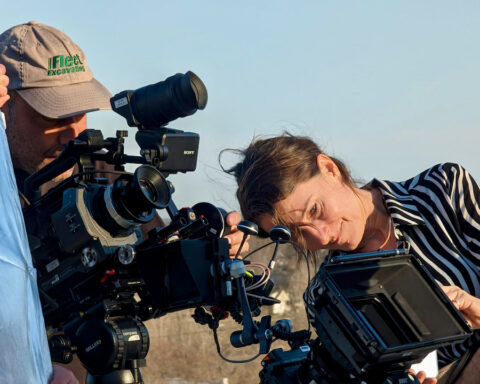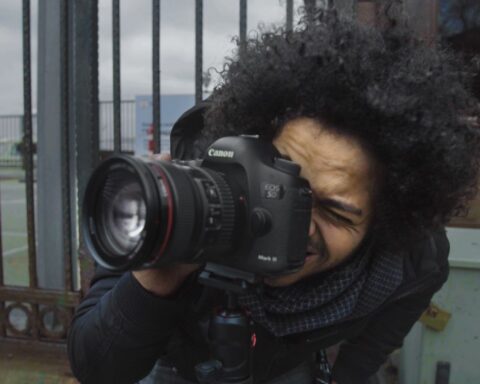I’ve been a cinema-addict since my film-besotted English father took me, age six, to a screening of Le ballon rouge. The child-addict became a teenaged actor, first in theatre, then television film, telephoning a theatre colleague at 13 to announce with wonder that ‘on film, you get to do a beach scene on a real beach!’”
Theatre was my craft, but film was magic. Its enchantment has persisted for me to the present day (even when sitting all day, waiting to shoot in a tiny dressing room that used to be a toilet).
So, in 1997, when theatrical agent Ralph Zimmerman rang to ask if I would replace a course leader, teaching Acting for Camera at an Ottawa workshop called SIFT (Summer Institute for Film and Television), I said an enthusiastic “yes.” A follow-up call came from SIFT-founder, Tom Shoebridge. The course to which I’d been assigned was called Film Acting for Beginners (R.H. Thomson would lead the next level, Master Class). I asked to call my course ‘Beginner and Intermediate’, as that more closely approximated what one encountered on a set. Happily, Mr. Shoebridge agreed, and off I went to the nation’s capital, making notes while on the VIA train.
The SIFT experience, for which I signed up every summer for four years, plus one bilingual workshop in Montreal, proved to be one of the best, most creatively enriching experiences in a life blessed by many such experiences (the mercifully smaller group, Boring Bummers, would belong in a different article). SIFT’s creative vitality was, in huge measure, due to the extraordinary mix of workshop leaders brought together by the knowledge, passion and supportive warmth of Tom Shoebridge, which seemed eagerly returned to him by leaders and participants alike.
By 1997, director Anthony Minghella had become an internationally celebrated film director, having written and directed Truly, Madly, Deeply and then adapting and directing Michael Ondaatje’s The English Patient. Anthony, who’d taught at SIFT pre-fame, returned, at his own expense, in 1993, to give a thank-you session. In 1997, he and Michael Ondaatje surpassed this former gift by presenting The Men in Black Show at the National Arts Centre, with all proceeds from the 600-seat sold-out event going to SIFT (they’d already done a version of this in Toronto, with proceeds to non-profit theatres). Its title came from the two men being attired in black suits and shirts. The NAC Minghella-Ondaatje ‘show’ consisted of the two reminiscing, tangentially, with frequent humour and fresh insights about films and filmmaking.
There was a lively Q & A after, notable for questions about filming in the desert, and an audience member asking if Count Almasy (Ralph Fiennes’s title character) was a Nazi. Ondaatje replied that the film was a love story, in which the occupying Germans knew where Almasy’s lost love might be found. “The English Patient in both book and screenplay is not historical biography,” he said. “It is a fictionalized love story.” Some audience members applauded, supporting the arc of the cinematic story. I was one of these. The Israeli producer seated next to me turned, stared, narrowed his eyes. We applauders aren’t Nazis either,’ I thought, ‘we’re just agreeing with a film’s path.’
The onstage event was followed by an autograph-signing meet-and-greet Tunisian feast (the film had been shot there), accompanied by Gabriel Jared’s brilliant English Patient score, to which I listen when I write books, regardless of the writing’s theme. Anthony (who would become a friend) and Michael stayed on for our work-week—sharing meals, visiting workshops, exchanging ideas.
Workshop leaders were invited to a nightly dinner meal hosted by Tom Shoebridge. There I met, among gifted others, Ken Chubb, who, with Shirley Barrie and Ottawa teacher-actor-playwright-director Lib Spry, had founded Tricycle, my favourite innovative London theatre. Lib, teacher-mentor to many theatre actors, would later honour me by becoming one of my film workshop participants. Expert in so many aspects of theatre, she had never done film. Our SIFT experience was rewarding for both of us.
After the buzzing hive of dinner, we’d all walk around the corner for screenings, panels and more interaction, attended by workshop leaders, participants and people involved with the film that was screening. Amazingly, we managed all this and still made it to our next day’s workshop each morning.
As we were working with aspects of film acting, I’d asked for an AV person (which then involved a camera and a boom mic). Nobody had requested this previously. I believed that actors, particularly the cinematically inexperienced, needed to see their faces and bodies on camera, learn stillness, trust themselves with thought-made-visible through their eyes, discover, as I had years earlier, their twitches and tics in close-up. Some had lisps and missing final consonants in any character, or accents that could be either useful or limiting, depending on the role. In many cases, participants were surprised to discover their on-camera selves. With steady input from ‘AV guy’, the brilliant and problem-solving Phil, and having only one camera, I created ‘walking masters’ that included moving into and out of group masters to two-shots and close-ups, while also dealing, not always perfectly, with boom-shadow (which, at the French workshop, due to its shape, was dubbed Mon mari “my husband”.
We shot two or three takes of each scene, which necessitated Phil and my staying after class at Hull’s Heritage College to pick the best one, which would be shown the following day and discussed by all of us (including those in the scene). This meant we frequently missed at least half of dinner and always missed changing clothes for the night’s screening. I did carry toothbrush, toothpaste and unscented deodorant.
There were too many remarkable participant performances to list here. I’ve kept up with some, lost others (usually my book-writing fault), but I do watch for and regularly find their names, attached to projects and fine reviews in film, television and theatre.
In my last SIFT summer, Tom Shoebridge had decided to resign, saying, “I don’t want to be Diefenbaker and stay too long.” The new management had a different feel, and, for many, a vision and charisma deficit. Shoebridgians leading workshops or on staff were let go or, feeling poorly treated, fled. Renamed CTST (Canadian Screen Training Centre), SIFT went downhill. Tom Shoebridge returned and tried valiantly to halt the downward spiral. Ultimately, there were too many holes, too much diminished morale, too many government policy changes for even the indefatigable Shoebridge to plug, change or heal. He continues now to lend his wisdom to film projects and people.
Through SIFT, interacting with Tom, as well as Anthony Minghella (whom I miss, both as friend and interrupted filmmaker), Michael Ondaatje, Jack Blum, Clement Virgo, Adam Beach, Marsha Chesley, Sharon Buckingham, other speakers and workshop leaders…and Phil, Phil, Phil, I became better at my work, with, as always, much more to learn before I sleep. Sometimes a superlative resource, such as SIFT, goes, but the memories, the information, the love and the magic (with or without a real beach) is ours to keep, and to utilize, always.











